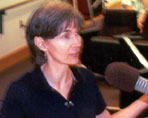
 |
PEACE TALKS: MAKING PEACE WTH OURSELVES IN TROUBLED TIMES
 Peace
Talks: Making Peace with Ourselves in Troubled Times, explores
the mystery of finding inner peace in the face of challenging circumstances.
Before an audience at the University of New Mexico in Albuquerque, host Suzanne
Kryder talks with meditation teacher Eric Kolvig, Ph.D. about coping with
inner conflict, in light of terrorist attacks and war, and in everyday life.
Peace
Talks: Making Peace with Ourselves in Troubled Times, explores
the mystery of finding inner peace in the face of challenging circumstances.
Before an audience at the University of New Mexico in Albuquerque, host Suzanne
Kryder talks with meditation teacher Eric Kolvig, Ph.D. about coping with
inner conflict, in light of terrorist attacks and war, and in everyday life.
Click
here to hear an hour-long version of the program in RealAudio, plus 15 minutes
of bonus Q + A.
You may also find out more about Peace Talks Radio at www.peacetalksradio.com
CD copies of the hour-long version of this program are available. Each CD also includes 15 minutes of bonus questions and answers from the recording session. For more information, email info@peacetalksradio.com or send a check made payable to GOOD RADIO SHOWS, INC. in the amount of $15.00. The price includes postage and handling. Mail your check to Good Radio Shows, PO BOX 35442, Albuquerque, NM 87176. Expect delivery in 2 to 3 weeks.
SHOW EXCERPTS
Transcription Courtesy Rogi Riverstone
SUZANNE KRYDER: Welcome, Eric. Later, we're going to talk about your response to 9/11. You've told me it was a very difficult time for you. But first, we're all faced with these ongoing threats of more terrorist attacks. I noticed myself, I worry a lot, particularly when I'm traveling. What helps you the most, to manage this kind of worry, and to maintain inner calm?
ERIC KOLVIG: One of my teachers once said to me, "If you want peace -- if you want to be happy -- then develop a heart that is ready for anything." Easy to say! I think for me, in part, developing peace in challenging times: keeping our hearts open in Hell -- which, at times, we're called to do -- means really engaging fear, really engaging the anxiety itself immediately.
SUZANNE: "Engaging the anxiety." When I get anxiety, boy, I'm sweating, my heart is pounding. How do I engage that?
ERIC: Franklin Roosevelt, when he first became President, his very first words to this country are the ones that are most memorable,"we have nothing to fear but fear, itself." This was in the middle of the Great Depression. A lot of people were suffering. In order to get past fear, to work our way through fear, we have to engage it directly, to see what it is. Fear is always about something in the future. It's never about something that's happening in the moment. The future doesn't exist. Fear is a projection of something that may, or may not, happen. If you can see you're simply projecting something into the future, you don't have to believe it. You can say, "I don't need to believe this." To come back to your present situation, no matter how challenging it is, by reducing the fear, your present situation is much more workable.
SUZANNE: So, we're basically making it up. We're making up these thoughts about it, but are we making up the body's response?
ERIC: I think the body follows the mind, actually. Not always! If you have a rattlesnake coiled, right in front of you, the body will respond and the mind will respond. And that's a kind of useful fear, to protect ourselves. Distinguish between a reasonable kind of fear, where we need to back off from a charging bull, and the kind of future that doesn't exist. Just one, little example: years ago, I was doing some deep, therapeutic work. I was working with some severe trauma that I'd had as a child. As a result of doing that work, terror actually came up, and not just in the therapeutic situation. I was driving to work one day, and I was experiencing terror: my hair was standing straight up; there were these waves of energy going through my body -- a very intense experience. My mind happened to be strong, at that moment, and so I knew it was just fear. I was able to hold it. I just held fear there, and just kept driving. I got to work. A coworker greeted me and said, "How are you doing?" I said, "well, I'm experiencing terror right now, but, otherwise, I'm fine." And it was true! In that moment, I didn't have to believe the terror. t was possible to feel all the physiological reactions, and all of the contraction in the mind, and say, "ok, this is just fear."
SUZANNE: So, eventually, it falls away. Eventually, we're going to be able to get back to this ideal steady-state, that we call, "inner peace." What is inner peace?
ERIC: Inner peace is an absence of inner conflict. It's an absence of anxiety. It's a quality of confidence, of calm, of a kind of happiness and a feeling of simplicity. It's nice, actually, inner peace.
SUZANNE: How do you help people, through meditation, to develop confidence and calm?
ERIC: It's basically what we do in our spiritual practice: to develop two qualities, an open heart and a clear mind. An open heart, basically a heart full of love, is a heart full of acceptance. It's willing to turn toward things without resistance. You can see how that would be an antedote anxiety or to fear, which is a resistance in the heart. A clear mind is simply seeing things for what they are. For example: I know, absolutely, that I will die -- that death is certain, and that the time of my death is uncertain. If I come to accept that fact, through the clarity of mind of simply seeing this is a truth, the fear of death begins to fall away. I begin, simply, to not be that concerned about dying. So, open heart, clear mind.
SUZANNE: Let's start with open heart. What's a technique, or a strategy, that we can use to develop that?
ERIC: There's an actual meditation practice for developing lovingkindness. When we talk about lovingkindness, in this culture, our concept of "love" is pretty devalued. This is not about Hallmark; it's not about sentimentality. It's really about a great power. Mohandas Gandhi said, if just one person developed love -- the highest form of love -- that love could neutralize the hate of millions. It's that powerful. With our present, global situation, we could use a few thousand Gandhis right now. There are ways of cultivating the heart, as it were, so that it is more and more open and accepting, no matter what the situation: by developing a sense of connection and benevolence and friendship toward all beings -- not only humans, but all living beings.
SUZANNE: How about clear mind? What's a specific technique, or tool, to develop a clear mind?
ERIC: Let's suppose that you're not feeling inner peace. Let's suppose that you're feeling just the opposite: that you're feeling a great deal of anxiety, worry and concern. My guess is that most of us experience this at some time in our lives. To use clear mind is to know what happens as it happens. What you would do is to bring awareness to your experience. If you're feeling a lot of anxiety, you will have certain sensations in your body that are associated with that experience. If you bring your attention to your body and actually feel those sensations -- simply by being with it, in that precise way, it helps to disolve it. Notice also what's happening in your mind. If we're feeling a lot of anxiety, it's very often anxiety about something. There's a big thought-story in the mind. Notice that. Realize, "I don't have to run this story!" and hit the "stop" button.
SUZANNE: I just watch my thoughts?
ERIC: This is something I've been doing the last, few months. It's been so useful! I just decided my own, particular tapes -- which have been running my entire life, unwholesome ones -- my particular tape is "I am alone, I have always been alone, I will always be alone." It comes from the trauma of my childhood. I say, "it's not true!" I don't ever have to intentionally think that again! I stay vigilent. When that thought, and other unwholesome thoughts come, I just hit the "stop" button. I don't have to believe that. I don't have to think that. It's very simple. As soon as you stop believing it, it falls away!
The following books were recommended by Eric Kolvig during the program:
Victor Frankl, "Man's Search for Meaning"
Joseph Goldstein and Jack Kornfield, "Seeking the Heart of Wisdom"
Stephen Levine, "A Gradual Awakening"
Marshall Rosenberg, "Nonviolent Communication: A Language of Compassion"
Lovingkindness Phrases that Eric Kolvig shared:
>May I be happy.
>May I be safe from all danger and harm.
>May I be healthy in body and mind.
>May I live with ease and well-being.
>May I be free.
For more about Eric Kolvig including his retreat schedule click here.
MORE ABOUT PEACE TALKS
Peace Talks is a series of public radio programs that investigates how people can make peace and pursue non-violent solutions to conflict - within themselves, their families and communities, and the world. In these tumultuous times on the planet, the Peace Talks series intends to offer listeners around the globe a chance to learn useful skills to address the conflict in their own lives. Peace Talks will bring them in contact with some of the leading proponents of non-violent conflict resolution - individuals who have made the pursuit of peace their life's work.